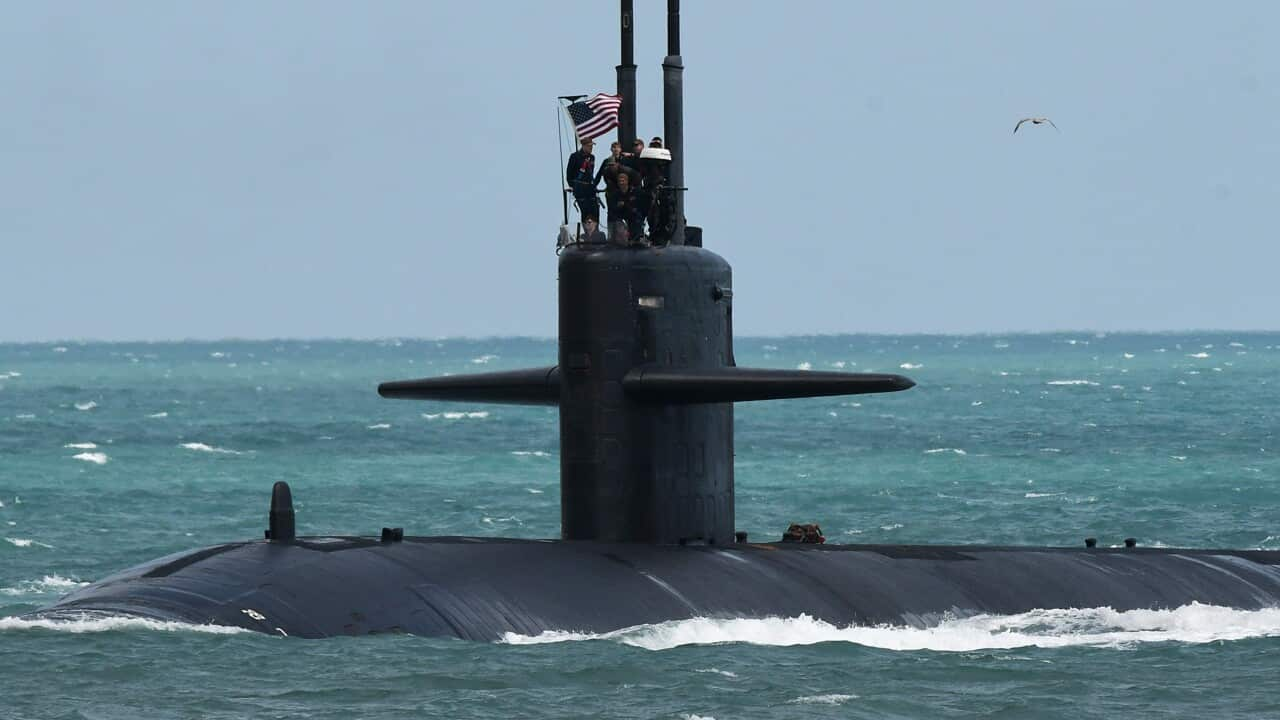Key Points
- Australia will reportedly purchase three US submarines, with the option to buy two more.
- These nuclear submarines won't be in the water until the late 2030s or even 2040.
- Prime Minister Anthony Albanese will unveil the deal on Tuesday in San Diego.
Australia is in the market for at least eight nuclear-powered submarines, at a cost of at least $100 billion - the largest defence acquisition in the nation's history.
Prime Minister Anthony Albanese, US President Joe Biden and UK Prime Minister Rishi Sunak are expected to reveal the details of the deal on Tuesday (AEDT) in San Diego, where they convened for an AUKUS meeting.
AUKUS is a trilateral security pact between Australia, the United Kingdom, and the United States.
What do we know about the nuclear submarine deal so far?
Australia will purchase three US Virginia class submarines in the early 2030s, with the option to buy an additional two, Reuters is reporting.
But Australia may need to invest in the strained American production line in order to secure the US-made vessels, the Wall Street Journal says.
US nuclear submarines will also reportedly start to rotate through Western Australia from around 2027.

Prime Minister Anthony Albanese will announce further details of the submarine deal alongside US President Joe Biden and UK Prime Minister Rishi Sunak in San Diego on Tuesday. Source: AAP / Dan Himbrechts
The American weapons system and upgrades would increase interoperability between the three navies, which would be using common technology.
The hybrid submarine won't be in the water until the end of the next decade or in the early 2040s.

Up to eight new Australian-made AUKUS class will be produced from the 2040s. Credit: Dana Jensen/AP
Australian naval personnel are also studying at US nuclear facilities and colleges to increase their skills.
The AUKUS agreement is also expected to accelerate the acquisition of guided weapons.
What are some of the concerns about the submarine deal?
America's submarine supply chain is already stretched and Australia won't be able to crew the larger and more technically complicated Virginia class submarines, increasing reliance on the US.
Similarly, reliance will also be increased because Australia won't have a domestic nuclear industry and have to rely on the US and UK for some repairs.
Acquiring two different models of nuclear-powered submarines also could be risky.
What have politicians said about it?
Defence Minister Richard Marles said while the submarines will have the capability to operate at war, "the true intent of this capability is to provide for the stability and for the peace of our region".
Opposition leader Peter Dutton also agreed these nuclear-powered submarines will act as a deterrent in the face of foreign threats.
"Adversaries would think twice about causing harm to our country, knowing that we have this capability."
However, China said the trilateral deal "constitutes serious nuclear proliferation risks, exacerbates arms race and hurts peace and stability in the Asia-Pacific".
"We urge the US, the UK and Australia to abandon the Cold War mentality," China's foreign ministry spokeswoman Mao Ning said.
Promise of more Australian jobs
Australia's plan to buy nuclear-powered submarines is expected to create about 20,000 jobs across the next three decades.
At its height, up to 8,500 Australian jobs will be supported to build and maintain the boats and will include highly-skilled scientists, engineers, project managers, and other trades workers.
"It's a very long-term project and with it will come a substantial number of jobs and huge investment and a real capability in the Australian economy," Environment Minister Tanya Plibersek told Seven's Sunrise.
"If we want to be an advanced manufacturing economy, these sorts of projects will really support that, so (it) is great for the defence of the nation."
Thousands of skilled workers will be needed to support growing supply chains, shipyards, and technical bases in all three countries.
Australian Academy of Science President Professor Chennupati Jagadish has warned the country is overly dependent on an overseas-trained workforce and lacks the capacity to train new nuclear scientists.
"Building capability in nuclear science will be central to achieving the aims of the Australian government in developing a nuclear-powered submarine capability," he said.
"Nuclear science in Australia faces a skills crisis. We are significantly behind our peer nations in national nuclear and radiation science capability."










